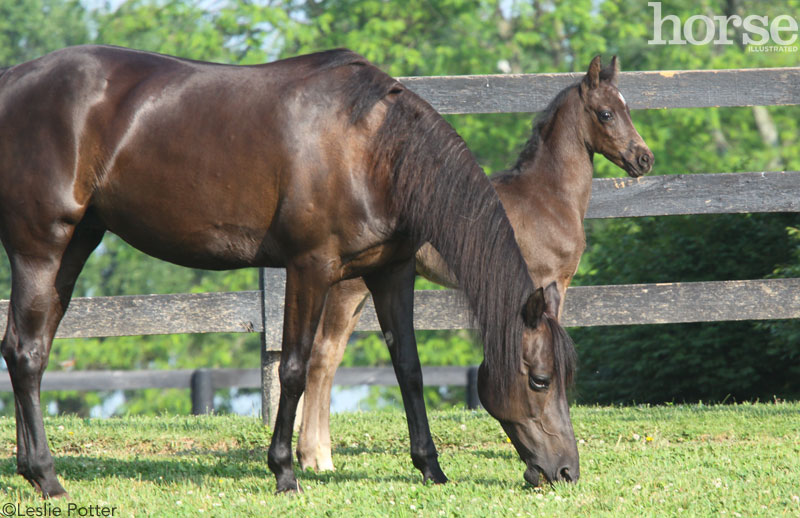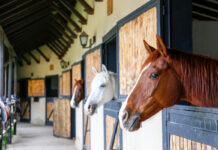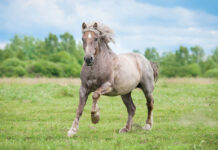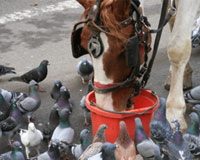It is important to know at which point in a broodmare’s life that you should stop breeding her. Read on to find out how old your broodmare can be.
A: As a general guideline, broodmares are past their reproductive prime as they approach about 15 or 16 years old. That being said, of course there are mares out there successfully foaling past this age and well into their twenties. However, most of these mares have a thorough reproductive history filled with numerous previous healthy pregnancies.

The best thing to do to properly evaluate your mare’s reproductive health and capacity is have your veterinarian perform a BSE (breeding soundness exam) on your mare. Rectal palpation with ultrasound will help your vet evaluate the health of your mare’s uterus and monitor her ovarian activity. Some mares begin to experience a decrease in the number of estrus (heat) cycles, or have more irregular cycles, as they age and palpation will detect the presence of follicles, cysts, and other ovarian structures, both normal and abnormal.
A uterine culture and biopsy may also be a good idea, especially since you indicate you have no knowledge of your mare’s past reproductive history. A uterine culture will indicate the presence of a subclinical uterine infection that would decrease your mare’s fertility and a uterine biopsy would show the microscopic details of the endometrium, or lining of the uterus, and may detect abnormalities that could not be felt on palpation.
If your mare is cleared with a clean reproductive exam, there are still further questions to think about before breeding her. Firstly, do you consider her genes good enough to pass on to another generation? You state she is a wonderful riding pony, but as carefully and objectively as possible, please evaluate these aspects further:
- How is your mare’s overall conformation?
- Does she have a good personality?
- What health problems has she had since you’ve had her?
Also consider your intentions for the foal: will you be raising this foal, or selling it? If you plan on selling the foal, does there appear to be a market for it? Do you or someone you know have the experience to properly train a young horse? Will your current financial situation be able to handle the increased costs of a foal in terms of veterinary care and extra feed? Keeping in mind that the last half-decade or so has seen an increase in unwanted horses in this country. Do you have a plan as to where this foal will fit in? Although these may seem like harsh questions, they are meant to get you to honestly assess your mare and think about whether it is really a good idea to breed your mare at all, regardless of her age. I would ask these questions of anyone considering breeding his/her mare for the first time.
My opinion is that I would be hesitant to breed your 20-year-old mare, given her age and her unknown reproductive history. I strongly encourage you to consider the above questions before making your choice on breeding your mare to become an old broodmare.






If only horses could talk and tell us their background. I have a young colt, that was born to a 24 yr old Arab mare. No I am not the owner of the mare. But he had to be weaned earlier than 4 mts, because of the mare’s health.
I agree with the Vet’s comments. I too have an older mare, she is 17. I hope to breed her again next spring. However, she has had 3 uncomplicated pregnancies in the last 5 years and cycles regularly. She does have ovarian cysts but my vet says they are no problem. We do monitor them. Personally even though I plan to breed an older mare I would not recommend or risk breeding a 20 year old virgin mare.
Pretend she’s a human. Why would you want to, it’s a tough job for anyone or anything. Pick up a rescue baby.
We had a 34 year old madien mare we used as a babysitter for weaning my Appaloosa colt. We thought she was way past ovulating. We were wrong! November 2011 at age 35, she gave birth to a beautiful healthy colt. I lived next to her stall for a week to provide assistance when the time came. She only required minimum assistance, light pulling on the forlegs when she stalled for about 10 minutes. We were very lucky, as I would never even consider breeding a mare that age, but mother nature never ceases to amaze. She has been a great mother and even produced enough milk for the colt to grow without any issues.
So so many unwanted horses…vet’s comments were right on. if you are not in the breeding business, why bring more animals into this world who will suffer because you think your horse will have beautiful babies?
PLEASE don’t breed ANY horse!!! Old, young, good, bad. Too many being abandoned and/or going to slaughter. Rescue one of the many horses already available.
Great advice.
Horses are now our pets.
SURPRISE !!!
No longer needed for agricultural use, transportation, or even meat ( by most countries). Change is occurring.
like it ? Or not.
Eventually we must move to preservation of breeds, regulation of use, especially regulation and maybe discontinue racing which is quickly become antiquated as it currently is exists, and regulation of breeding farms similar to regulation on puppy mills.
I personally would love to see breeding licensing for breeders. That is, licensing, required education, and
“ presale” requirements put into place, and regulation for those breeders on less than 1000 acres.
Thanks for pointing out that personality factors in when thinking about whether a horse is still young enough to breed. My husband will be retiring a few years earlier that I will and he would like to start breeding horses as a hobby once he does. Maybe helping him shop for German dressage horses would be a good way to spend the day after his retirement party soon.
I was hoping to find the answer to my question. At what age will a mare stop having heat cycles? Or do they? Just put a gelding in with my 30 year old POA who immediately went into heat. ?
@Alice Carroll Please read the above replies–they are talking about your husband.